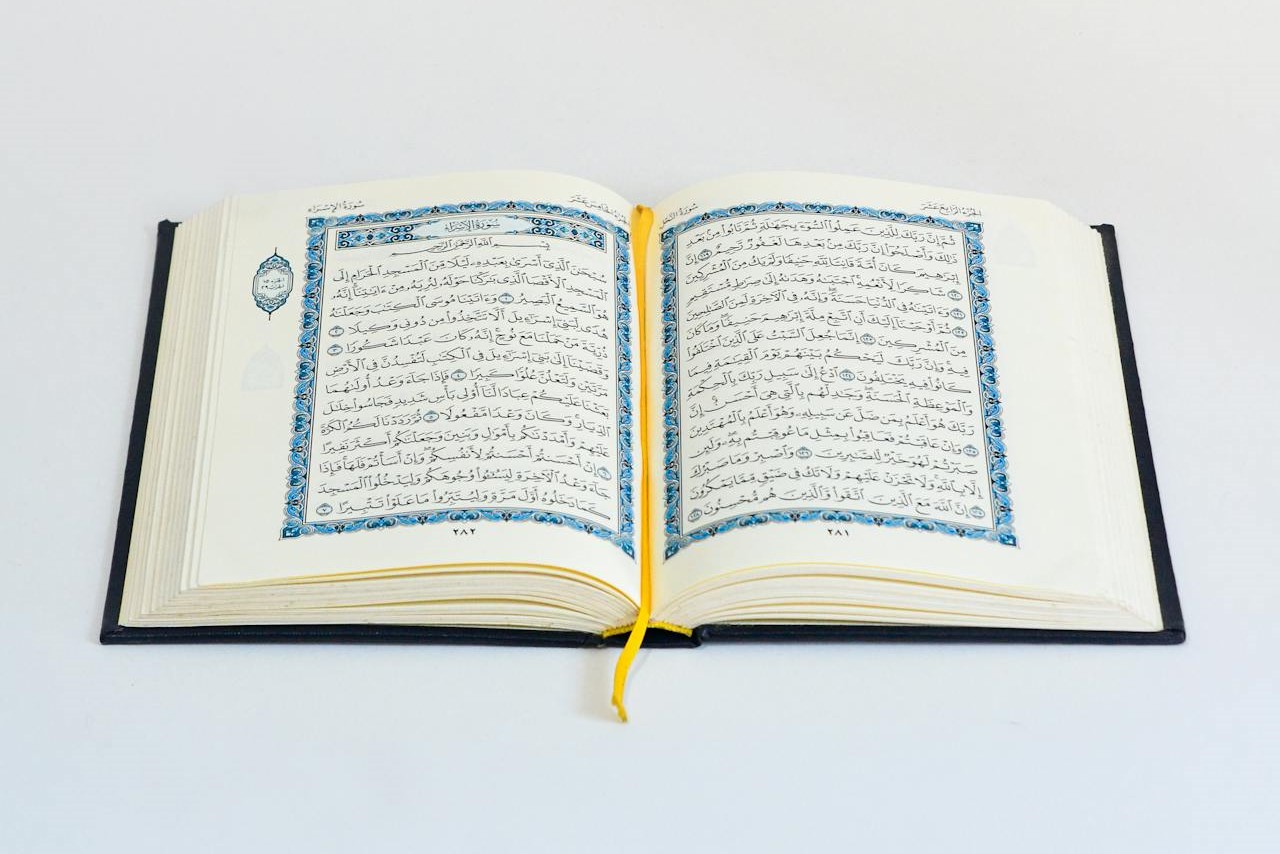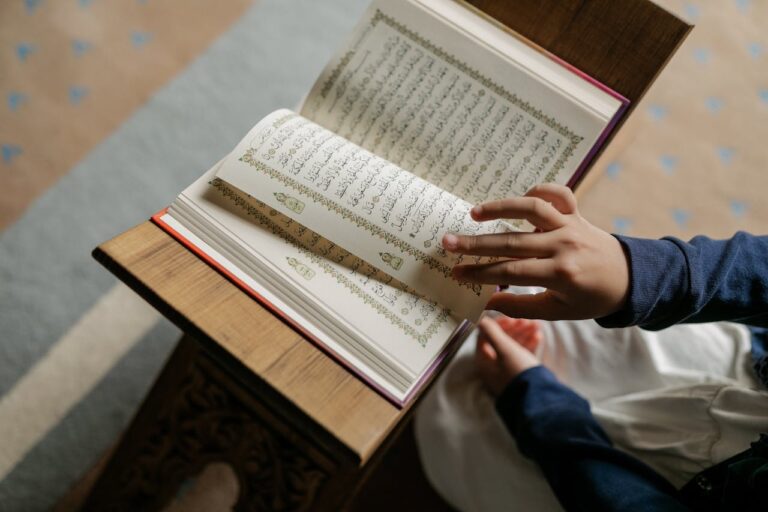Understanding a Juz in Quran as Divider of The Divine Text
For Muslims, the Quran is more than just a religious scripture; it is a source of guidance, solace, and spiritual nourishment. It’s a book that stands at the centre of Islamic teachings and one that is valued for its depth, wisdom, and ability to transform lives. Central to the experience of reading the Quran is the concept of ‘Juz,’ which helps divide the Quranic text into manageable sections. This guide aims to deepen your understanding of Juz in Quran, its significance, and how it contributes to a fulfilling practice and appreciation of the Quranic message.
What is Juz in Quran?
In Arabic, ‘Juz’ translates to ‘part’ or ‘section,’ and in the context of the Quran, it refers to one of the thirty equal divisions of the Quranic text. Juz serves both as a practical reading guide and a contextual aid, enabling reflection on the Quran’s themes in smaller, digestible units. It’s called “parah” in Iran and the Indian subcontinent.
The Historical Background of Juz in Quran
The division of the Quran into thirty Juz can be traced back to early Islamic scholars who sought to make the Quran more accessible to followers. These divisions were not part of the original revelation but were introduced to facilitate recitation and study.
In medieval times, when buying a manuscript of the Quran was too expensive for most Muslims, many copies of the Quran were placed in mosques for people to read. These copies often consisted of thirty parts, known as ‘Ajza’ (a plural of ‘Juz’). Some use these parts to recite the Quran over a month.
Evolution Over Time
Over time, various scholars contributed to refining and standardizing the Juz divisions. Today, these divisions are universally recognized, creating a unified structure for the Quran that resonates across all Muslim communities.

Understanding the Structure of Juz in Quran
How the Quran is Divided?
The Qur’an consists of 30 Parts (Ajza) and 114 Chapters (Surahs). In the sub-continental script, there are four quarters for every Juz (Rub’, Nisf, Thuluth, and Kamil). This Mushaf also divides the Qur’an into 540 to 558 paragraphs (Ruku) approximately and seven Manzil.
According to the ‘Uthmani Arab script’, there is a Hizb system of division, where each Juz is divided into two halves (Hizb), each Hizb is further subdivided into four quarters. This results in each Juz having eight-quarter divisions called a Maqra. Depending on the Mushaf you use, the number of pages per Juz may vary.
List of Juz in Quran
The Quran is divided into 30 Juz. Each Juz is named after the first word of its first verse. In the Uthmani script, each Juz is further divided into 8 Maqras, which are practical sections used for revision when memorizing the Quran. So, there are 240 Maqras in total. The most commonly memorized Juz is Juzʼ Amma, the 30th Juz, which includes chapters (Surahs) 78 through 114, containing many of the shortest chapters in the Quran. 30 juz names in the Quran are given as follows:
|
Juz |
Names of Juz in Quran |
Chapters |
|
| 1 | آلم | Al-Baqarah (Verse:1) – Al-Baqarah (Verse:141) | |
| 2 | سَيَقُولُ | Al-Baqarah (Verse:142) – Al-Baqarah (Verse:252) | |
| 3 | تِلْكَ ٱلْرُّسُلُ | “Al-Baqarah (Verse:253) – Āl ‘Imrān (Verse:92) | |
| 4 | لن تنالوا | Āl ‘Imrān ( Verse:93) – An-Nisā’ (Verse: 23) | |
| 5 | وَٱلْمُحْصَنَاتُ | An-Nisā’ (Verse:24) – An-Nisā’ (Verse:147) | |
| 6 | لَا يُحِبُّ ٱللهُ | An-Nisā’ (Verse:148) – Al-Mā’idah (Verse:82) | |
| 7 | وَإِذَا سَمِعُوا | Al-Mā’idah (Verse:83) – Al-An‘ām (Verse:110) | |
| 8 | وَلَوْ أَنَّنَا | Al-An‘ām (Verse:111) – Al-A‘rāf (Verse:87) | |
| 9 | قَالَ ٱلْمَلَأُ | Al-A‘rāf (Verse:88) – Al-Anfāl (Verse:40) | |
| 10 | وَٱعْلَمُواْ | Al-Anfāl (Verse:41) – At-Tawbah (Verse:93) | |
| 11 | يَعْتَذِرُونَ | At-Tawbah (Verse:94) – – Hūd (Verse:5) | |
| 12 | وَمَا مِنْ دَآبَّةٍ | Hūd (Verse:6) – Yūsuf (Verse:52) | |
| 13 | وَمَا أُبَرِّئُ | Yūsuf (Verse:53) – Ibrahim (Verse:52) | |
| 14 | رُبَمَا | Al-Hijr (Verse:1) – An-Naḥl (Verse:128) | |
| 15 | سُبْحَانَ ٱلَّذِى | Al-Isrā’ (Verse:1) – Al-Kahf (Verse:74) | |
| 16 | قَالَ أَلَمْ | Al-Kahf (Verse:75) – Ṭā Hā (Verse:135) | |
| 17 | ٱقْتَرَبَ لِلْنَّاسِ | Al-Anbiyāʼ (Verse:1) – Al-Ḥajj (Verse:78) | |
| 18 | قَدْ أَفْلَحَ | Al-Muʼminūn (Verse:1) – Al-Furqān (Verse:20) | |
| 19 | وَقَالَ ٱلَّذِينَ | Al-Furqān (Verse:21) – An-Naml (Verse:59) | |
| 20 | أَمَّنْ خَلَقَ | An-Naml (Verse:60) – Al-‘Ankabūt (Verse:44) | |
| 21 | أُتْلُ مَاأُوْحِیَ | Al-‘Ankabūt (Verse:45) – Al-Aḥzāb (Verse:30) | |
| 22 | وَمَنْ يَّقْنُتْ | Al-Aḥzāb (Verse:31) – Yā Sīn (Verse:21) | |
| 23 | وَمَآ لي | Yā Sīn (Verse:22) – Az-Zumar (Verse:31) | |
| 24 | فَمَنْ أَظْلَمُ | Az-Zumar (Verse:32) – Fuṣṣilat (Verse:46) | |
| 25 | إِلَيْهِ يُرَدُّ | Fuṣṣilat (Verse:47) – Al-Jāthiyah (Verse:37) | |
| 26 | حم | Al-Aḥqāf (Verse:1) – Adh-Dhāriyāt (Verse:30) | |
| 27 | قَالَ فَمَا خَطْبُكُم | Adh-Dhāriyāt (Verse:31) – Al-Ḥadīd (Verse:29) | |
| 28 | قَدْ سَمِعَ ٱللهُ | Al-Mujādilah (Verse:1) – At-Taḥrīm (Verse:12) | |
| 29 | تَبَارَكَ ٱلَّذِى | Al-Mulk (Verse:1) – Al-Mursalāt (Verse:50) | |
| 30 | عَمَّ | An-Nabaʼ (Verse:1) – An-Nās (Verse:6) | |
The Importance and Benefits of Reading Juz
There are many benefits to reciting the Quran by Juz, including:
- It makes it easier to recite the Quran in its entirety over a month.
- Juz divisions were to make to recite the Quran during the month of Ramadan.
- It helps to improve memorization of the Quran.
- Quran in Juz makes it convenient to recite it daily.
- It helps to develop a deeper understanding of the Quran.
- It is a source of spiritual reward.
- Reading Juz daily, especially within the context of regular prayer, serves as a reflective and meditative practice.
- It encourages a deep personal connection to the Quran and its teachings, leading to a more conscious and mindful way of living.
Conclusion – Uniting with Juz in Quran
Reading the Quran is more than a religious obligation; it is an opportunity for personal growth and spiritual fulfilment. Engaging with Juz in Quran is a meaningful step toward that aim, serving as a weekly or monthly milestone in the continuous, lifelong process of studying this Divine text. May this guide inspire you to incorporate the practice of Juz recitation into your daily routine and to experience the profound effects it can have on your spiritual well-being.
“Start Your Journey Today: Enroll Now and Experience the Beauty of Quranic Learning!”
FAQs
How many Juz are in the Quran?
There are 30 Ajza in the Quran, making it easiest to read in a month.
What are the benefits of reciting the Quran by Juz?
The benefits of reciting the Quran by Juz include improved memorization, a deeper understanding of the Quran.
How to identify Juz in Quran?
It is very simple to identify Juz in Quran. The start of a new Juz may be indicated in a Qur’an manuscript through a marker, writing the first word in bold or in different colors etc.
What does Juz mean in Quran?
It refers to one of the thirty equal divisions of the Quranic text to recite the Quran over a month, especially during Ramadan.
Which one is the easiest Juz in Quran?
We cannot say, either a Juz is easy or difficult. However, Juz Amma (The Last Juz in Quran) consisting of 78 chapters is considered as easy to memorize.
How many juz in Quran makes a Manzil?
Quran has 7 manzils making it easy to complete in one weed for Huffaz. Approximately, every manzil is divided into 4 and a half juz.









